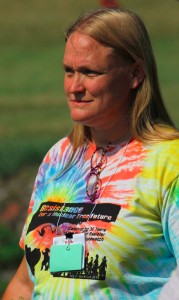Y12 Resisters’ Sentencing • Day Six, Part 2: Beth Rosdatter
Report from Ralph Hutchison, OREPA
To fully appreciate Beth Rosdatter’s sentencing hearing, one would have to have been present during the trial in May. Before the trial, Judge Bruce Guyton ruled a few things out of bounds—any discussion of nuclear policy, nuclear weapons, faith, motivation, good intent, and, mostly, anything that might evoke sympathy or understanding on the part of a juror. He was granting a prosecution request at the time, and the problem he ran into early on, with the first witness, was the prosecution asking about nuclear policy.
It wasn’t until later in the trial, when Beth took the stand, that the prosecutor asked her a direct question about her motive. She hesitated, then looked at the judge and said, “I think she just asked me a question you don’t want me to answer.” This precipitated a sidebar conversation with the lawyers, at the end of which the judge admonished all parties to be mindful of his ruling.
Eventually Beth and the others were found guilty of trespass for their July 2010 crossing of the boundary at the Y12 Nuclear Weapons Complex in Oak Ridge, Tennessee, and she remained free on recognizance bond until today, when she stood before the judge.
”This defendant,” said prosecutor Melissa Kirby, departing from her customary minimal report to the judge, “show a bit of defiance. In her sentencing memo she says the court’s sentence will have no deterrent effect, and during her testimony at trial she violated the court’s order and the court had to instruct her.” It was a stunning display of audacity, but it only lasted a moment.
Beth’s lawyer rose to explain, pointing out that the sentencing memo did not express particular defiance from Beth, but pointed out that for some protesters with deeply held beliefs, there is no deterrent effect possible. “Tax resisters,” said Wayne Scarborough, “believe it is their duty as citizens to resist paying taxes, and they will continue to resist no matter what the law says or what the IRS does.”
He went on to tell the judge that Beth requested she be shown no leniency not extended to her co-defendants, and no probation or supervised release. Then he pointed out that during the trial, the sidebar and admonishment was occasioned by the questioning of the prosecution, in violation of the order it had requested.
The judge had one question. “Ms. Rosdatter, if you are sentenced to a prison term, do you intend to enter custody today?” Beth answered, “Yes.” She was then called to the lectern for her elocution.
“I’ve been reading portions of the testimony of other defendants,” she said, “and they have spoken eloquently to many of the issues I would talk about—Bonnie talking about the justice system, Steve Baggarly speaking of the morality of nuclear weapons, and Brad explaining how the weapons actually make us all less safe.
“I just want to say the government says we threatened the security of the United States by crossing the line. That is a lie. They know it is a lie. The threat is not us—the threat to our security is the bombs; all we are doing is saying they are there. If we are a threat, we are a threat to the policy of hegemony. These bombs are illegal, and the government covers that up. The system protects the powerful at the expense of the rest of us, and that is unjust.”
The judge recessed the hearing to make arrangements for Beth’s custody and returned a few minutes later to hand down a sentence of one month imprisonment, no supervised release, and no fine. “You are immediately remanded to the custody of the Attorney General,” he said, and it was over.
The marshals allowed her a quick hug with her son, Arlo, 15 years old. “Quickly,” he said. “You are in custody.” And then they put the cuffs on and led her away.
